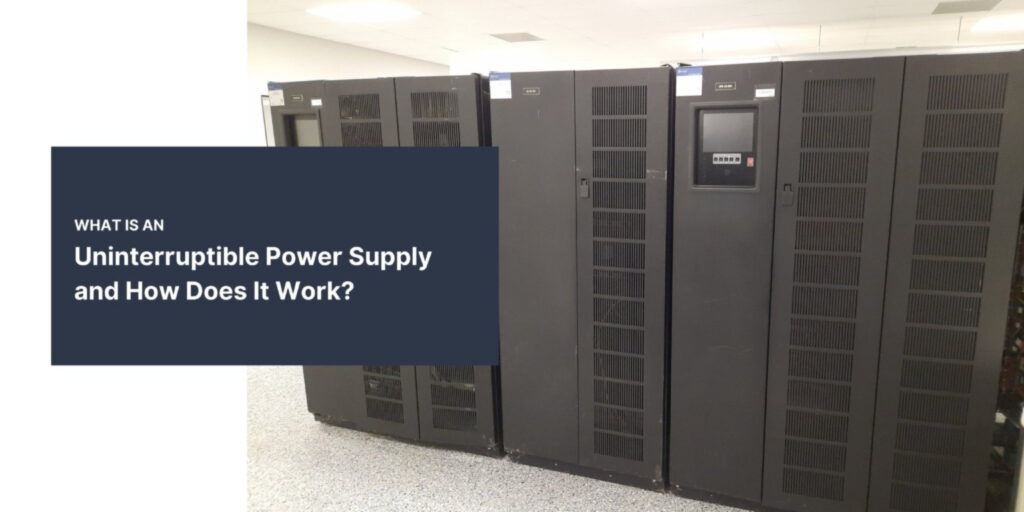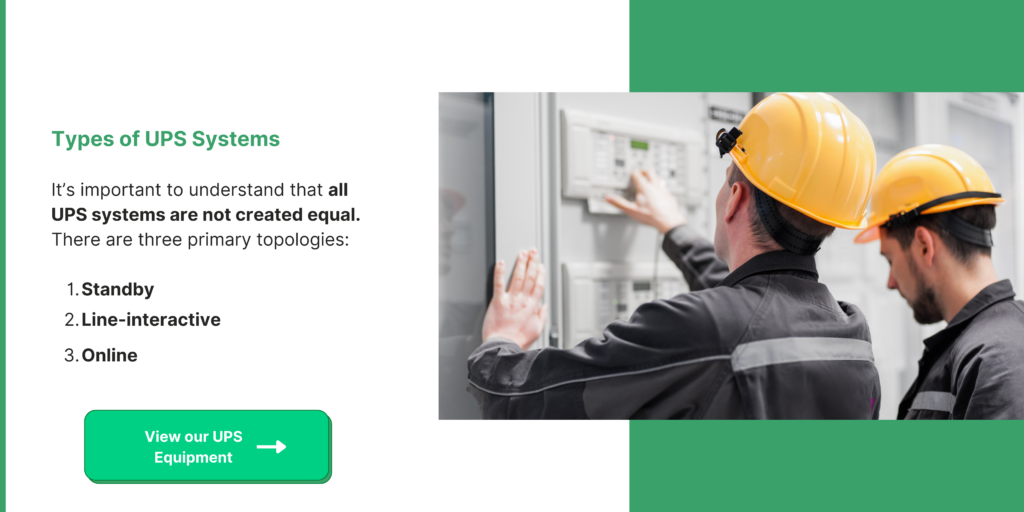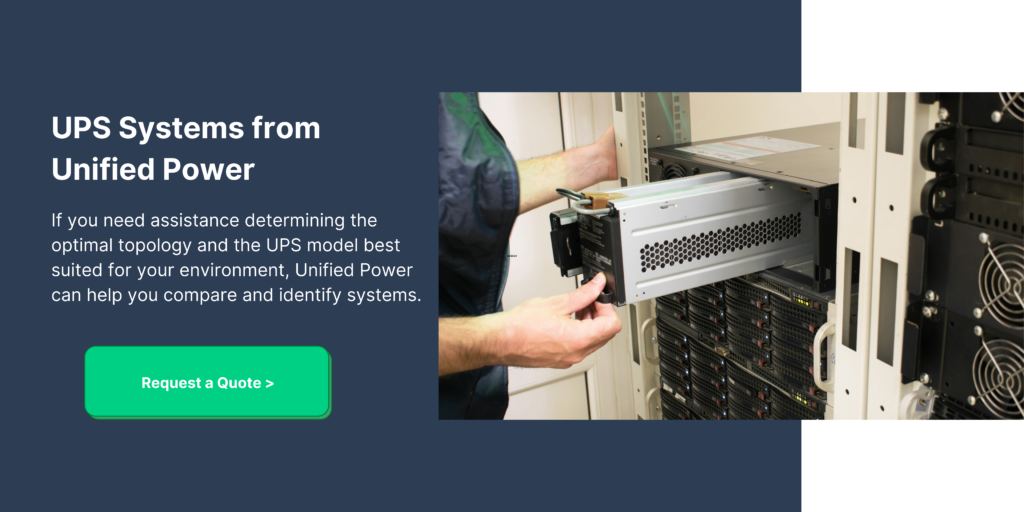
Across today’s highly connected and data-driven business landscape, the need for continuous, clean power cannot be overstated. Even the briefest downtime can be devastating to an organization, regardless of its size or vertical. The price tag for downtime is estimated at $5,600 per minute, and unplanned incidents can result in equipment damage, data loss, missed opportunities and tarnished reputation.
Thankfully, an uninterruptible power system (UPS) is one of the simplest, most cost-effective solutions to help companies avoid the unwelcome consequences of downtime. But with several types of systems available, the challenge is selecting one that best matches your needs and budget.
What Is a UPS System?
A UPS system is a backup solution that supplies power in the event of a utility failure. By supplying an adequate window to safely shut down sensitive equipment, a UPS helps prevent data loss and minimizes the stress of a hard shutdown on electronics.
Protecting equipment against a complete power loss isn’t the only reason you need a UPS. Depending on the UPS model, these systems also shield connected devices from common power problems and unsafe output voltage fluctuations that can damage electronics, reduce life span and affect performance.
How Does a UPS Work?
How Does a UPS Work?
A UPS works by converting AC power to DC power and storing it in a battery. Then, it converts the DC power back to AC power, running it to your building’s AC outlets. Your connected devices will continue to operate on the stored battery power, giving you time to save your work and shut down the computer.
Essentially a battery in a box, a UPS powers the devices plugged into its AC outlets when electricity flow drops to an inadequate voltage or a complete outage occurs. In a power emergency, the UPS electrical system instantly switches to the battery to provide a continuous power source for the length of the battery, which varies by system for periods ranging from minutes to hours. Additionally, the conversion process removes most of the line noise from the AC outlet.
Depending on the size and technology of the unit, a UPS can protect a single computer up to an entire data center. Essential for mission-critical environments, a UPS keeps computer systems and IT equipment safe and operational during a power loss until generators can be activated or protected devices, such as servers and network components, can be properly shut down. This helps prevent lost data while saving work-in-progress.
In addition to delivering backup power during a utility failure, UPSs also afford varying degrees of protection against other damaging power problems, including:
- Voltage sags
- Surges
- Brownouts
- Line noise
- Frequency variations
- Overvoltage conditions
- Switching transients
- Harmonic distortion

Benefits of a UPS Power Supply
There are numerous benefits to deploying a UPS, including:
1. Minimized Effects From Power Outages
UPSs protect against utility power failures, which occur on a dramatically increasing basis. While outages can result from a wide variety of issues — including automobile accidents, animal interference and overtaxed power grids — severe weather ranks as the top cause of power failures in the United States. From hurricanes to heat waves and flooding to freezing rain, weather is leaving organizations in the dark for longer than it has in the past, largely due to climate change fueling more violent storms.
2. Protection Against Power Variances
In addition to keeping equipment operational during a power loss, a UPS also acts as a filter to shield devices against variances in the power supply, which can damage sensitive equipment like computers and network gear.
Depending on the topology, a UPS allows only a steady stream of clean power to reach attached devices, helping safeguard against common power anomalies that can damage equipment. Additionally, battery backup prevents data loss and provides time to save work in progress during outages, surges or other power variances.
3. Increased Peace of Mind
Finally, a UPS provides confidence that your organization can avoid the financial cost, customer frustration and business disruption caused by network downtime — and you can’t put a price tag on peace of mind. Whether protecting a network closet, a few server racks or an entire data center, it is imperative to safeguard against equipment damage, downtime and data loss.

Find UPS Power Supplies From Unified Power
It’s more critical than ever for organizations of every size to protect their operations against the impacts of downtime. While all three UPS topologies outlined above meet the input voltage requirements for IT equipment, there are significant differences in both performance and demands on the battery.
The best topology for your organization depends on numerous factors, including the level of reliability and availability required, the type of equipment being protected and the overall application/environment. If you need assistance determining the optimal topology and UPS model for your environment, Unified Power can help you compare and identify systems. Contact us today and let us know how we can help!
